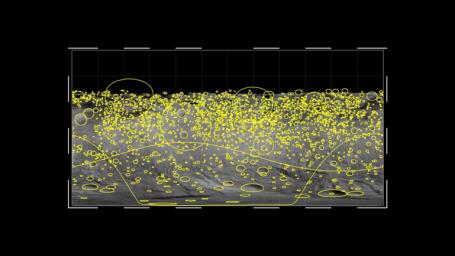
|
Crater Impacts on Vesta
- Click the image above for a larger view
- Full-Res JPEG (1280 x 720) (123.7 kB)
- Full-Res TIFF (1280 x 720) (2.8 MB)
Caption:
This graphic shows the global distribution of craters that hit the giant asteroid Vesta, based on data from NASA's Dawn mission. The yellow circles indicate craters of 2 miles (4 kilometers) or wider, with the size of the circles indicating the size of the crater. The two huge impacts in the southern hemisphere appear as undulating lines in this projection.
Background Info:
The Dawn mission to Vesta and Ceres is managed by NASA's Jet Propulsion Laboratory, a division of the California Institute of Technology in Pasadena, for NASA's Science Mission Directorate, Washington. UCLA is responsible for overall Dawn mission science. The Dawn framing cameras were developed and built under the leadership of the Max Planck Institute for Solar System Research, Katlenburg-Lindau, Germany, with significant contributions by DLR German Aerospace Center, Institute of Planetary Research, Berlin, and in coordination with the Institute of Computer and Communication Network Engineering, Braunschweig. The framing camera project is funded by the Max Planck Society, DLR and NASA/JPL.
More information about Dawn is online at http://www.nasa.gov/dawn and http://dawn.jpl.nasa.gov .
Cataloging Keywords:
| Name | Value | Additional Values |
|---|---|---|
| Target | 4 Vesta | |
| System | Main Belt | |
| Target Type | Asteroid | |
| Mission | Dawn | |
| Instrument Host | Dawn | |
| Host Type | Orbiter | |
| Instrument | ||
| Detector | ||
| Extra Keywords | Color, Crater, Impact | |
| Acquisition Date | ||
| Release Date | 2012-05-10 | |
| Date in Caption | ||
| Image Credit | NASA/JPL-Caltech/MPS/DLR/IDA/LSI | |
| Source | photojournal.jpl.nasa.gov/catalog/PIA15660 | |
| Identifier | PIA15660 | |
